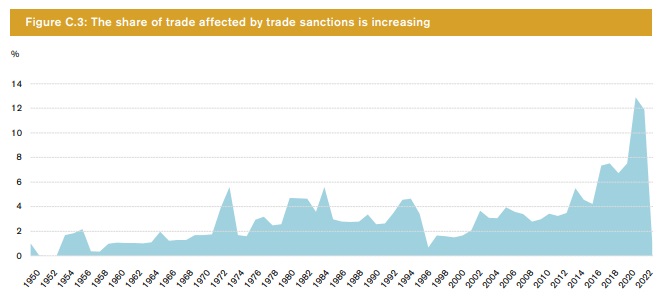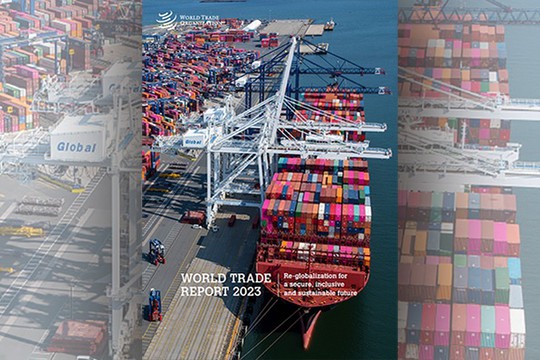The 2023 edition of the WTO’s World Trade Report presents new evidence of the benefits of broader, more inclusive economic integration as early indications of trade fragmentation threaten to unwind growth and development.
“The post-1945 international economic order was built on the idea that interdependence among nations through increased trade and economic ties would foster peace and shared prosperity. For most of the past 75 years, this idea guided policymakers, and helped lay the foundation for an unprecedented era of growth, higher living standards and poverty reduction,” WTO Director-General Ngozi Okonjo-Iweala says in her foreword to the report. “Today this vision is under threat, as is the future of an open and predictable global economy.”
In introducing the report at the opening of the WTO's annual Public Forum on 12 September, WTO Chief Economist Ralph Ossa said: “In particular, the report makes the case for extending trade integration to more economies, people, and issues, which is a process that we call “re-globalization.”
Starting with an analysis of the current state of globalization, the report confirms that geopolitical tensions are beginning to affect trade flows, including in ways that point towards fragmentation of trading relationships. WTO Secretariat calculations find, for example, that goods trade flows between two hypothetical geopolitical blocs — based on voting patterns at the UN General Assembly — have grown 4-6 per cent more slowly than trade within these blocs.
However, the report contends that, despite these findings, international trade continues to thrive, implying that talk of de-globalization is on balance still not supported by the data. The publication points to the expansion of digital services trade, environmental goods trade, and global value chains in addition to the resilience of trade to recent global crises.
The report goes on to examine the relationship between economic integration and three major challenges facing today's global economic order: security and resilience, poverty and inclusiveness, and environmental sustainability — areas in which arguments have gained ground that globalization has not delivered as expected or exposes countries to excessive risks.
Looking at the evidence, the report makes the case that “re-globalization,” which is the renewed drive towards integrating more people, economies and pressing issues into world trade, is a more promising solution to these issues than fragmentation.
The report shows that trade openness is strongly linked with a reduced likelihood of conflict and has led to sharp declines in poverty for over four decades. Also, technology improvements enabled by trade have had a strong impact in reducing carbon emissions.
WTO trade monitoring data shows, for instance, how the onset of the war in Ukraine was followed by an increase in export restrictions, a trend also observed during the COVID-19 pandemic. Export restrictions on critical raw materials have increased more than five-fold in the last decade.
Figure C.3 displays the share of trade affected by sanctions using the Global Sanction Database (GSD) which includes data on trade sanctions from one economy to another by year.
 Source: Global Sanctions Database. IMF Direction of Trade Statistics.
Source: Global Sanctions Database. IMF Direction of Trade Statistics.
The report can be downloaded here. An executive summary of the report is available here.
read more in our Telegram-channel https://t.me/The_International_Affairs

 11:12 20.09.2023 •
11:12 20.09.2023 •























